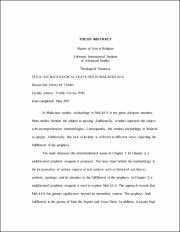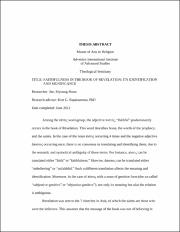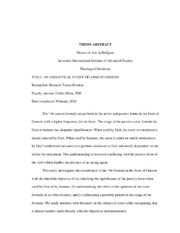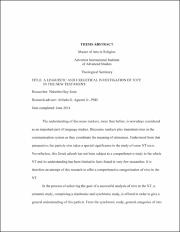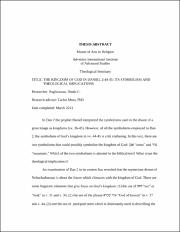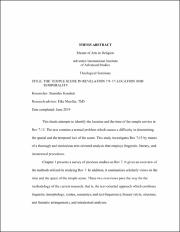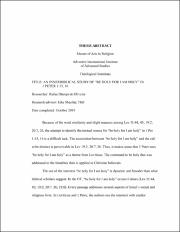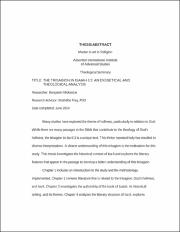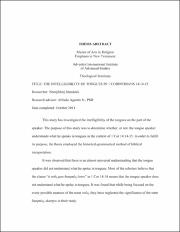Search
Now showing items 1-10 of 16
Eschatological features in Malachi 4:1-6
(Adventist International Institute of Advanced Studies, 2017-05)
In Malachian studies, eschatology in Mal 4:1-6 is not given adequate attention. Most studies mention the subject in passing. Additionally, scholars approach the subject with incomprehensive methodologies. Consequently, ...
Faithfulness in the book of Revelation : it's identification and significance
(Adventist International Institute of Advanced Studies, 2012-06)
Among the πίζηηο word-group, the adjective πηζηόο, “faithful” predominantly occurs in the book of Revelation. This word describes Jesus, the words of the prophecy, and the saints. In the case of the noun πίζηηο occurring ...
An Exegetical study of ARAR in Genesis
(Adventist International Institute of Advanced Studies, 2016-02)
The ארר (curse) formula occurs both in the active and passive forms in the book of Genesis with a higher frequency for the latter. The usage of the passive curse formula by God or humans has disparate significances. When ...
A Linguistic and exegetical investigation of tote in the New Testament
(Adventist International Institute of Advanced Studies, 2014-06)
The understanding of discourse markers, more than before, is nowadays considered
as an important part of language studies. Discourse markers play important roles in the
communication system as they coordinate the meaning ...
The kingdom of God in Daniel 2:44-45 : its symbolism and theological implications
(Adventist International Institute of Advanced Studies, 2013-03)
In Dan 2 the prophet Daniel interpreted the symbolisms used in the dream of a great image as kingdoms (vv. 36-45). However, of all the symbolisms employed in Dan 2, the symbolism of God’s kingdom in vv. 44-45 is a bit ...
The Temple scene in Revelation 7:9-17 : location and temporality
(Adventist International Institute of Advanced Studies, 2019-06)
This thesis attempts to identify the location and the time of the temple service in
Rev 7:15. The text contains a textual problem which causes a difficulty in determining
the spatial and the temporal loci of the scene. ...
An Innerbiblical study of "be holy for I am holy" in 1 Peter 1:15,16
(Adventist International Institute of Advanced Studies, 2019-10)
Because of the word similarity and slight nuances among Lev 11:44, 45; 19:2; 20:7, 26, the attempt to identify the textual source for “be holy for I am holy” in 1 Pet 1:15, 16 is a difficult task. The association between ...
The Meaning of Jesus' EPXOMAI 'coming' statements in Revelation 2 and 3
(Adventist International Institute of Advanced Studies, 2014-09)
Scholars are divided as to whether Christ's tpyopa{ statements in Rev 2:5,16. and,
3:11 refer to personal judgments, or to Christ's literal second advent at the end of the
eschaton. For {pyopa( to represent personal ...
The Trisagion in Isaiah 6:3 : a theological and exegetical study
(Adventist International Institute of Advanced Studies, 2014-06)
Many studies have explored the theme of holiness, particularly in relation to God.
While there are many passages in the Bible that contribute to the theology of God's holiness, the trisagion in Isa 6:3 is a unique text. ...
The Intelligibility of tongues in 1 Corinthians 14:14-15
(Adventist International Institute of Advanced Studies, 2014-10)
This study has investigated the intelligibility of the tongues on the part of the
speaker. The purpose of this study was to determine whether, or not, the tongue speaker
understands what he speaks in tongues in the context ...

